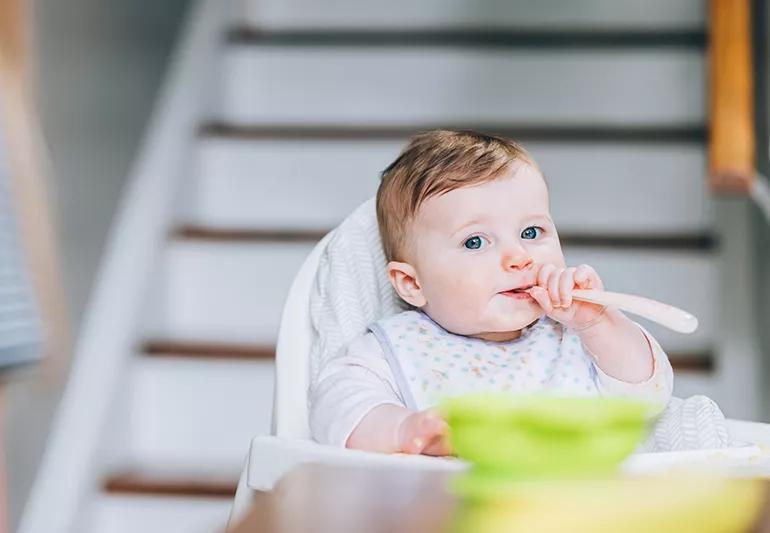Variety has long been the spice of life. Now, it can also help keep your child safe.

Image content: This image is available to view online.
View image online (https://assets.clevelandclinic.org/transform/3666a2e4-0085-4694-9771-bee1e0ab39f2/baby-food_jpg)
Baby Food
Your baby may be consuming metal — and not just because they enjoy sucking on the cans they find in the pantry. One recent report claimed that 95% of baby foods contain toxic heavy metals including arsenic, cadmium, lead or mercury.
Advertisement
Cleveland Clinic is a non-profit academic medical center. Advertising on our site helps support our mission. We do not endorse non-Cleveland Clinic products or services. Policy
This alarming finding might have you wondering if you need to toss the jars of baby food in your pantry, or whether it’s time to buy that trendy machine so you can make your kiddo’s food from scratch.
“At first glance, these reports are scary, but it’s important to take a step back and see the big picture,” says registered dietitian Evelyn Benden, RD.
Here she gives you the scoop on when worrying is warranted. (Spoiler: Most of the time, it’s not.)
At high levels, heavy metals are toxic to infants and children. They may:
The crucial phrase there is “at high levels.” Benden explains that metal levels in most foods are extremely low — too low to cause any damage.
“Most of these metals are naturally occurring in soil, water or air,” she explains. “Plants absorb them as they grow, leaving trace amounts of the metals in the plants we consume.”
So most parents don’t need to be too concerned, she says: “The key is to provide your child with a healthy variety of foods, in moderation, so they aren’t eating too much of one thing. They’ll get lots of different nutrients and not an overload of heavy metals.”
Benden offers these tips when dealing with foods that have higher amounts of heavy metals:
Rice. Rice products tend to be heavier in arsenic. While traditionally rice was a baby’s first food, that’s not necessarily the case anymore. Because babies’ stores of iron and zinc are decreasing right around the time they start eating solids, you can offer iron-fortified oatmeal or multigrain cereal instead of rice. You can even offer puréed meats as the first food.
Advertisement
“I tell parents to keep in mind that a lot of snacks, like puffs or teething biscuits, are rice-based, so read the label and choose a different option,” Benden says, noting that white basmati rice and sushi rice have half the arsenic as other types.
Root vegetables. Root vegetables grow under the soil, where they remain until they are harvested. As a result, they may have higher levels of heavy metals. While carrots and sweet potatoes are excellent sources of vitamin A, they should be just one part of your child’s diet — not the primary source of vitamins. Offer a variety of fruits and veggies to minimize your child’s exposure to metals.
Fruit juices. Past studies have found that fruit juices like apple and grape juice contain arsenic and lead. Since the American Academy of Pediatrics doesn’t recommend juice for children under age 1, offer breastmilk or formula instead. “Once your child turns 1, limit their juice intake to less than one-half cup a day,” Benden recommends.
Protein powders. Plant-based protein powders (think soy) contain more arsenic, cadmium and lead than their whey- or egg-based counterparts. “Infants and young children don’t need protein powders,” Benden says. “Stick with breastmilk or formula. When kids are old enough, switch to whole milk.”
Still skeptical? If you’re thinking it’s probably safest to either choose organic baby foods or buy organic ingredients to make your own, think again.
“You’re going to have to contend with heavy metals even if you make food from scratch or buy organic,” Benden says. “The standards used to label foods as organic don’t take into account the quantity of heavy metals in soil.”
But, most baby food and formula companies do rigorously test their products, and usually the amount of heavy metals in these products is lower than the standards set by the government, she says.
“If you offer your child a variety of foods and limit foods that have higher heavy metal concentrations, you don’t need to worry about these new study results,” she concludes.
Advertisement

Delivered every Tuesday!
Sign up for our Health Essentials emails for expert guidance on nutrition, fitness, sleep, skin care and more
It's a letter about the news!

Every two weeks once
Sign up for our Health Essentials emails for expert guidance on nutrition, fitness, sleep, skin care and more.
Learn more about our editorial process.
Advertisement
Here's the scoop on one healthy way to feed your baby
When and how to introduce solid foods into your baby's diet
The short answer from a pediatrician
Babies should wean off the bottle at 18 months
How to make baby food at home
The short answer from a pediatrician
A pediatrician weighs in on this whole foods approach to weaning
The short answer from a pediatrician
Type 2 diabetes isn’t inevitable with these dietary changes
Applying a hot or cold compress can help with pain
Pump up your iron intake with foods like tuna, tofu and turkey